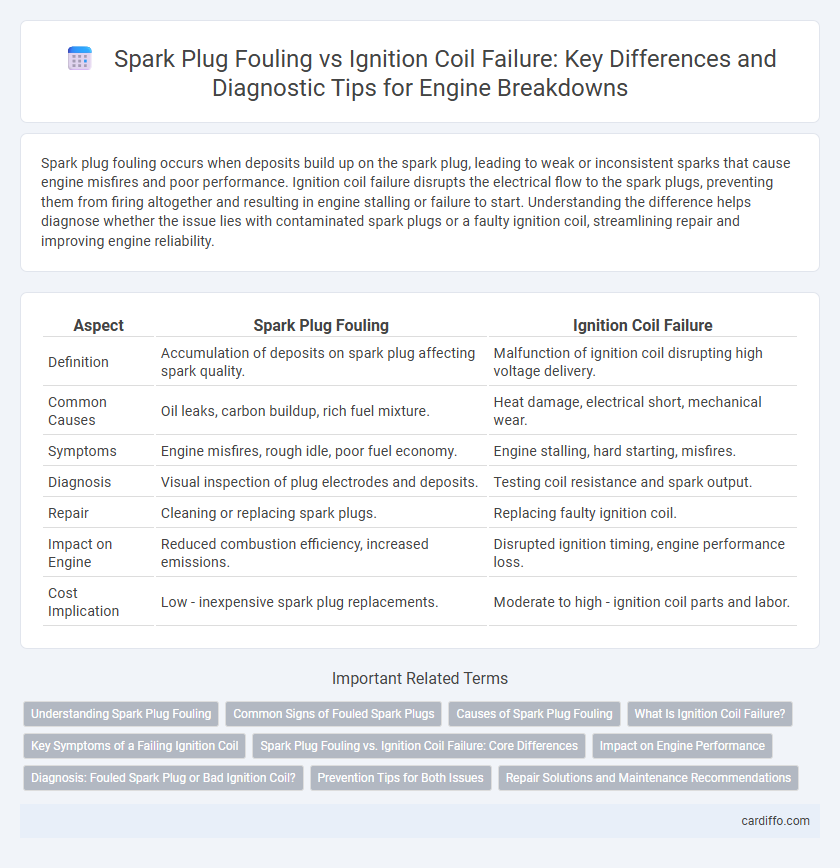Spark plug fouling occurs when deposits build up on the spark plug, leading to weak or inconsistent sparks that cause engine misfires and poor performance. Ignition coil failure disrupts the electrical flow to the spark plugs, preventing them from firing altogether and resulting in engine stalling or failure to start. Understanding the difference helps diagnose whether the issue lies with contaminated spark plugs or a faulty ignition coil, streamlining repair and improving engine reliability.
Table of Comparison
| Aspect | Spark Plug Fouling | Ignition Coil Failure |
|---|---|---|
| Definition | Accumulation of deposits on spark plug affecting spark quality. | Malfunction of ignition coil disrupting high voltage delivery. |
| Common Causes | Oil leaks, carbon buildup, rich fuel mixture. | Heat damage, electrical short, mechanical wear. |
| Symptoms | Engine misfires, rough idle, poor fuel economy. | Engine stalling, hard starting, misfires. |
| Diagnosis | Visual inspection of plug electrodes and deposits. | Testing coil resistance and spark output. |
| Repair | Cleaning or replacing spark plugs. | Replacing faulty ignition coil. |
| Impact on Engine | Reduced combustion efficiency, increased emissions. | Disrupted ignition timing, engine performance loss. |
| Cost Implication | Low - inexpensive spark plug replacements. | Moderate to high - ignition coil parts and labor. |
Understanding Spark Plug Fouling
Spark plug fouling occurs when deposits such as carbon, oil, or fuel contaminants accumulate on the spark plug, leading to misfires and reduced engine performance. This fouling disrupts the spark plug's ability to generate a strong spark, causing inefficient combustion and increased emissions. Differentiating spark plug fouling from ignition coil failure is crucial, as fouling affects the plug's surface, while coil failure impacts the spark generation system electronically.
Common Signs of Fouled Spark Plugs
Common signs of fouled spark plugs include engine misfires, poor fuel economy, and difficulty starting the vehicle. The deposits on the spark plugs disrupt the ignition process, causing rough idling and reduced engine performance. Unlike ignition coil failure, which often results in a complete loss of spark, fouled spark plugs typically cause inconsistent sparks and intermittent breakdowns.
Causes of Spark Plug Fouling
Spark plug fouling occurs when deposits such as carbon, oil, or fuel residue accumulate on the electrode, disrupting ignition efficiency. Common causes include rich fuel mixtures, weak ignition coils, worn piston rings, or malfunctioning fuel injectors leading to incomplete combustion. Persistent fouling can result in misfires, reduced engine performance, and increased emissions.
What Is Ignition Coil Failure?
Ignition coil failure occurs when the coil's internal windings or insulation degrade, preventing it from generating the high voltage needed to ignite the air-fuel mixture in the spark plugs. Unlike spark plug fouling, which is caused by deposits affecting spark efficiency, ignition coil failure results in weak or no spark across all cylinders, leading to engine misfires and poor performance. Diagnosing ignition coil failure involves checking for error codes, measuring coil resistance, and inspecting for physical damage or corrosion.
Key Symptoms of a Failing Ignition Coil
Key symptoms of a failing ignition coil include engine misfires, rough idling, decreased fuel efficiency, and difficulty starting the vehicle. Unlike spark plug fouling, which primarily causes poor combustion due to electrode contamination, ignition coil failure disrupts the electrical current necessary for spark plug operation. Ignition coil issues often trigger the check engine light and can lead to increased emissions and engine performance problems.
Spark Plug Fouling vs. Ignition Coil Failure: Core Differences
Spark plug fouling is typically caused by carbon deposits, oil contamination, or fuel additives, leading to misfires and poor engine performance, whereas ignition coil failure results from electrical malfunctions that disrupt the spark generation process entirely. Fouled spark plugs exhibit symptoms such as rough idling, reduced fuel efficiency, and increased emissions, while a failed ignition coil often causes engine stalling, difficulty starting, and a complete loss of spark. Diagnostic techniques differ as spark plug fouling can be identified through physical inspection and cleaning, whereas ignition coil failure requires electrical testing with a multimeter or scan tool to detect coil resistance or misfire codes.
Impact on Engine Performance
Spark plug fouling causes misfires and rough idling by disrupting the combustion process, leading to reduced engine power and increased fuel consumption. Ignition coil failure results in weak or no spark delivery, causing complete engine misfire, difficulty starting, and severe loss of acceleration. Both issues significantly degrade engine performance and should be diagnosed promptly to maintain optimal vehicle operation.
Diagnosis: Fouled Spark Plug or Bad Ignition Coil?
Diagnosing whether a breakdown is caused by a fouled spark plug or a bad ignition coil involves inspecting spark plugs for black, oily deposits indicative of fouling, which disrupts proper ignition. Testing the ignition coil with a multimeter can reveal resistance issues or open circuits, signaling coil failure. Engine misfire, rough idle, and difficulty starting can result from either, but coil failure often triggers a check engine light with specific diagnostic trouble codes.
Prevention Tips for Both Issues
Regularly inspecting and replacing spark plugs every 30,000 to 50,000 miles prevents fouling caused by carbon buildup, oil leaks, or improper air-fuel mixture. To avoid ignition coil failure, ensure secure electrical connections, maintain proper engine temperature, and replace coils at the first sign of misfiring or rough idling. Consistent engine tune-ups and using manufacturer-recommended spark plugs and coils optimize ignition system performance and reduce breakdown risks.
Repair Solutions and Maintenance Recommendations
Spark plug fouling often results from carbon buildup or oil contamination, requiring thorough cleaning or replacement to restore optimal engine performance. Ignition coil failure demands diagnostic testing to confirm coil integrity, followed by replacing the faulty coil to prevent misfires and engine stalling. Regular maintenance such as timely spark plug inspection, use of high-quality fuel, and checking ignition system components can significantly reduce the risk of both issues and enhance vehicle reliability.
Spark plug fouling vs ignition coil failure Infographic

 cardiffo.com
cardiffo.com